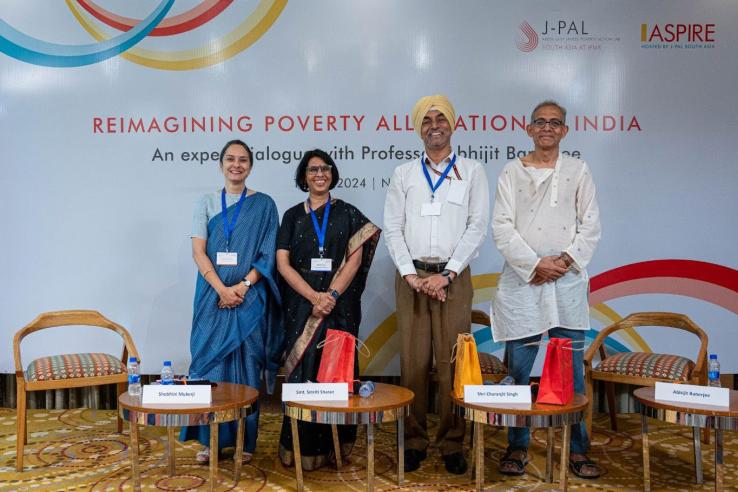Reimagining Poverty Alleviation in India: An Expert Dialogue With Abhijit Banerjee

On July 11, 2024, J-PAL South Asia hosted an exclusive roundtable in New Delhi with Government of India's Ministry of Rural Development (MoRD) and Abhijit Banerjee, Ford Foundation International Professor of Economics, Massachusetts Institute of Technology; Director, J-PAL, to reimagine how India can tackle extreme poverty through scalable, evidence-based solutions, in line with the Government of India’s vision of ‘Samaveshi Aajeevika’.
MoRD's Samaveshi Aajeevika Yojana (Inclusive Livelihoods Program) is a comprehensive livelihoods program designed to put rural women on the path to self-sufficiency. The program adapts the globally successful Graduation Approach model and is being rolled out across 10 states in India. J-PAL South Asia has been supporting the MoRD in catalyzing the adoption of scientific evidence and data in their decision-making as it expands Samaveshi Aajeevika in India.
J-PAL South Asia’s partnership with MoRD is generously supported by ASPIRE, a joint initiative by J-PAL South Asia and Veddis Foundation, set up to drive impactful change on a large scale.
A timely conversation on inclusive livelihoods
The roundtable spotlighted the importance of effective policy design and collaborative partnerships in achieving the Government of India’s vision of inclusive livelihoods at the last mile.
The discussions unpacked the significance of evidence-based interventions such as the Graduation Approach—a holistic, time-bound livelihoods program developed by BRAC and rigorously evaluated by J-PAL-affiliated researchers across six countries. Graduation Approach has consistently shown a long-term impact in enabling ultra-poor households to achieve self-sufficiency and escape extreme poverty.
Banerjee delivered the keynote, reflecting on his two-decades long journey with the Graduation Approach. Speakers from government and civil society shared on-the-ground innovations and lessons from adapting this model to Indian context.
Key highlights
The roundtable brought together senior leaders from government, philanthropy, and civil society, including representatives from:
- Ministry of Rural Development (MoRD)
- Bandhan-Konnagar
- The/Nudge Institute
- BRAC
Participants engaged in a rich dialogue on:
- DAY-NRLM’s strategy for addressing extreme poverty
- How global lessons can be effectively contextualized for India
- Emerging innovations from Indian implementation partners
The event made significant contributions to Government of India's ongoing efforts of a 'Viksit Bharat' and reinforced the critical role of evidence, innovation, and collaboration in driving meaningful progress toward ending extreme poverty.